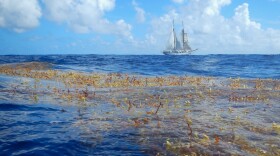-
You may know sargassum as the stinky algae that periodically washes ashore, but it's been an important breeding habitat for many marine species in the Atlantic.
-
Under Pressure: 15 years after Deepwater Horizon, a look at new technology risks for Florida's coastFifteen years after Deepwater Horizon, some scientists and environmentalists worry the industry's new technology could bring risks to Florida's coast.
-
When President Luiz Inácio Lula da Silva of Brazil returned to power, he had an ambitious goal: restoring his country’s image as a champion of climate action. Yet three years after returning to office, Lula heads into the world’s most important climate talks with a more checkered track record.
-
Fifteen elementary schools in Miami-Dade County are composting their rotting jack-o-lanterns.
-
This year’s United Nations climate summit got underway in Belém, Brazil, on Thursday. The meeting, known as COP30, comes during another year of record heat and extreme weather around the globe.
-
The National Weather Service has issued a coastal flood statement — the lowest alert level — for Florida’s east coast.
-
It has become a tired adage, but nonetheless true. The world’s poorest countries will suffer the most from climate change despite being least responsible for it.
-
Josh Wilkie and Fabio Galarce leaned over the side of their boat and hauled up a basket full of oysters, each just an inch or two in size. Wilkie grabbed his shucking knife, popped one open and slurped down the silky meat inside.
-
Miami-Dade has been slow to catch up with other states and other Florida communities in embracing large-scale composting. While landfills have continued to fill up, there hasn’t been a clear path in the county code for community composters to legally operate. That just changed.
-
Seasonal king tides, the annual spate of highest tides of the year, brought coastal flooding across much of the region — much of it relatively minor and brief, thanks in large part to mostly clear and dry skies.
-
The Miami blue butterfly alone has dropped by a minimum of 99% in area of occupancy and population size since 1992. To find out what’s happening, the Herald spoke to a conservation and research specialist at Zoo Miami, Tiffany Moore, to answer readers’ questions about the link to climate change.
-
Daylight, rainfall, and temperatures have a significant impact on the plants shutting down (or not) and eventually having their leaves change colors, and the weather factors are shifting.
Play Live Radio
Next Up:
0:00
0:00
Available On Air Stations












